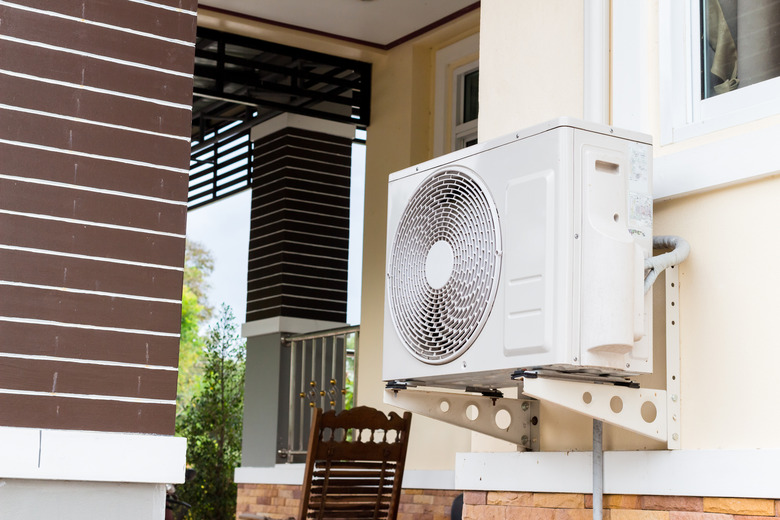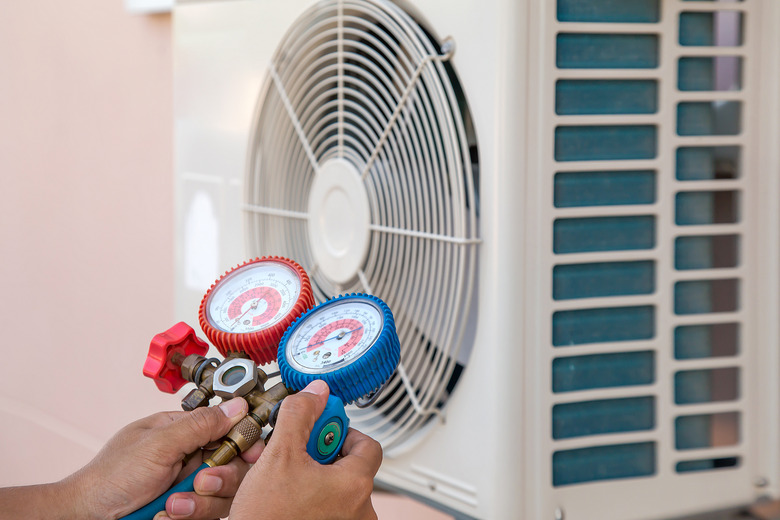Heat Pump Maintenance: What You Can Expect On A Professional Service Visit
We may receive a commission on purchases made from links.
All central HVAC systems (heating and cooling) require servicing from time to time, and this is especially true of heat pump maintenance since these systems have unique components that are quite different from traditional fuel-burning or electric forced-air furnace systems. The activities performed by the service technician during a heat pump maintenance call will depend on the problems you are experiencing, but you may be able to avoid nearly all repair issues if you have routine tune-ups performed on your heat pump.
Because this type of system has two distinctly different seasons — one for the heating months and another for the cooling season — most experts suggest two tune-ups each year for a heat pump system. This type of routine heat pump maintenance will usually prevent the more serious (and expensive) service calls, where major repairs or replacement of key parts becomes necessary.
Heat Pump Tune-Up Checklist
Heat Pump Tune-Up Checklist
The checklist of routine inspection and service performed by a heat pump specialist should include many items. However, remember that not all heat pump systems include all components. For example, the parts for a central air-source heat pump system that uses forced-air ductwork, for example, are different from minisplit ductless systems. And geothermal systems have additional pumps and piping that aren't included in more common air-source heat pumps.
It's a good idea to comparison shop when you are looking for a heat pump maintenance specialist. Ask for a list of what the service technician will do during the tune-up visit. You can gauge the comprehensiveness of the tune-up by the number of tasks the technician routinely performs. A good service technician usually doesn't mind if you watch and ask questions while the tune-up is being performed, though it's a good idea to ask before you tag along.
A good tune-up visit will include many or all of these tasks. Many of these can be done routinely by a homeowner, but checking refrigerant levels, recalibrating thermostats or replacing parts is generally a job for a professional. Many homeowners choose to do one tune-up each year themself and then call in a professional technician for another more comprehensive tune-up that includes testing the refrigerant levels and thermostats.
Air Filters
Check and change the air filter for the indoor air handlers if necessary. Minisplit heat pump systems include one or more indoor air handlers mounted on your walls, and each one has an internal air filter that should be cleaned or replaced regularly. You can (and should) clean these filters yourself monthly. If your technician discovers a badly clogged filter, they should clean it and also show you how to perform this regular duty. With central heat pump systems, there is also a filter at the blower unit that should be replaced.
Motors and Electrical
Oil the motors and check the belt for wear, adjusting the tension if necessary. For best efficiency, the outdoor condenser fans should run smoothly without slippage of the belts or making squealing noises. The technician should inspect these belts, tightening them as needed or suggesting a replacement if a belt is worn.
Inspect the electrical components for the indoor air handler and outdoor condenser. This review may involve measuring the amperage draw at the wire connections. These connections often need to be cleaned and tightened along with being coated with a rust-preventing lubricant. Loose or dirty wire connections make for higher energy usage and can also cause the unit to run hotter. This inspection should also involve checking the unit's disconnect switches and time delay functions. These components help prevent blown fuses and other electrical hazards.
Check the safety panels and safety switches on the condenser. The outdoor condenser is designed to shut down if the safety panels aren't fully secured, so the technician should check their fit and operation.
Coils and Airflow
Clean the indoor evaporator coil and the coil and fins on the outdoor condensing unit. The heat exchange will be much more efficient if these parts are kept clean.
Check airflow through the condensing unit. This goes hand in hand with cleaning the coil and fins. As part of this review, the service technician may check temperatures across different parts of the coil while the unit is running. Temperatures should be relatively uniform across all areas of the coil, indicating efficient operation. The technician may suggest changing the landscaping if there are shrubs or other plants blocking efficient airflow through the system.
Refrigerant
Measure the refrigerant levels. This is perhaps the most important duty a technician performs during a tune-up. Refrigerant levels that are too low can cause the evaporator coils in the air handlers to ice over, raising your operating costs and possibly leading to permanent damage. If the technician discovers a refrigerant leak, she should seal it and add additional coolant as needed. A complete draining and replacement of the fluid may also be recommended. This repair will likely add cost to the basic tune-up expense.
Reversing Valve
Check the reversing valve. This is the valve that allows the system to shift back and forth from heating to cooling mode, and it needs to operate smoothly. If there are problems with this valve, you may notice problems when you try to shift from cooling to heating modes. Replacement of this part where needed is also an added expense.
Defrost and Condensate
Check the defrost assembly. Some heat pumps are equipped with electric heaters designed to keep the coils free of ice. If such a heater is present, the technician should check its operation. Some defrosters operate according to a timer, which the technician should check for proper operation.
Check condensate drains. In air conditioning mode, most heat pumps remove moisture from the air, and the drain lines that drain the condensed moisture from the air handlers must be free of blockage. Blocked condensate lines can lead to ice buildup in the air handlers and other problems.
Ductwork and Thermostats
Check the ductwork and seal any leaks with aluminum tape. Central heat pump units that use forced-air ductwork will run more efficiently if duct leaks are sealed. Repairs to the ductwork may also be needed at additional cost. Test the thermostats for accuracy and recalibrate them if necessary. Recalibration is usually part of the tune-up fee, though thermostat replacement is an added cost.
Maintenance and Repair Costs
Maintenance and Repair Costs
Nationally, the average cost for a routine tune-up is $75 to $150. This is good insurance against repair costs for a neglected system, which can be much more costly than this. If you have a comprehensive service contract for your heat pump system, it may include one annual tune-up for free or at a discounted rate.
While routine tune-ups will prevent many problems with heat pumps, over time, you may find it necessary to replace any of the components that are checked during a tune-up, or it may be necessary if a problem with your system demands a special service call. Unless you have an ongoing service contract (an excellent idea if you have a heat pump), you should expect to pay extra for any additional part replacements.
Nationally, a heat pump maintenance call that includes repair of damaged or worn-out parts averages about $375 within a typical range of $150 to $600. However, the costs can be much higher if the problem is significant.
The most common heat pump repairs include:
- Replacing/adding refrigerant: $100 to $350
- Replacing thermostats: $100 to $700
- Replacing the reversing valve: $200 to $650
- Replacing the defrost control board: $150 to $600
- Repairing the condenser: $150 to $1,000 (up to $2,000 for full replacement)
- Repairing ductwork: $250 to $700
- Full heat pump replacement: $4,000 to $7,000
Regular tune-ups from a professional service technician can prevent many expensive problems with a heat pump heating/cooling system. Make sure your technician reviews all the important components of the system during these tune-ups. Having a comprehensive service contract for your heat pump system is often a good idea since major repairs can be quite expensive.

